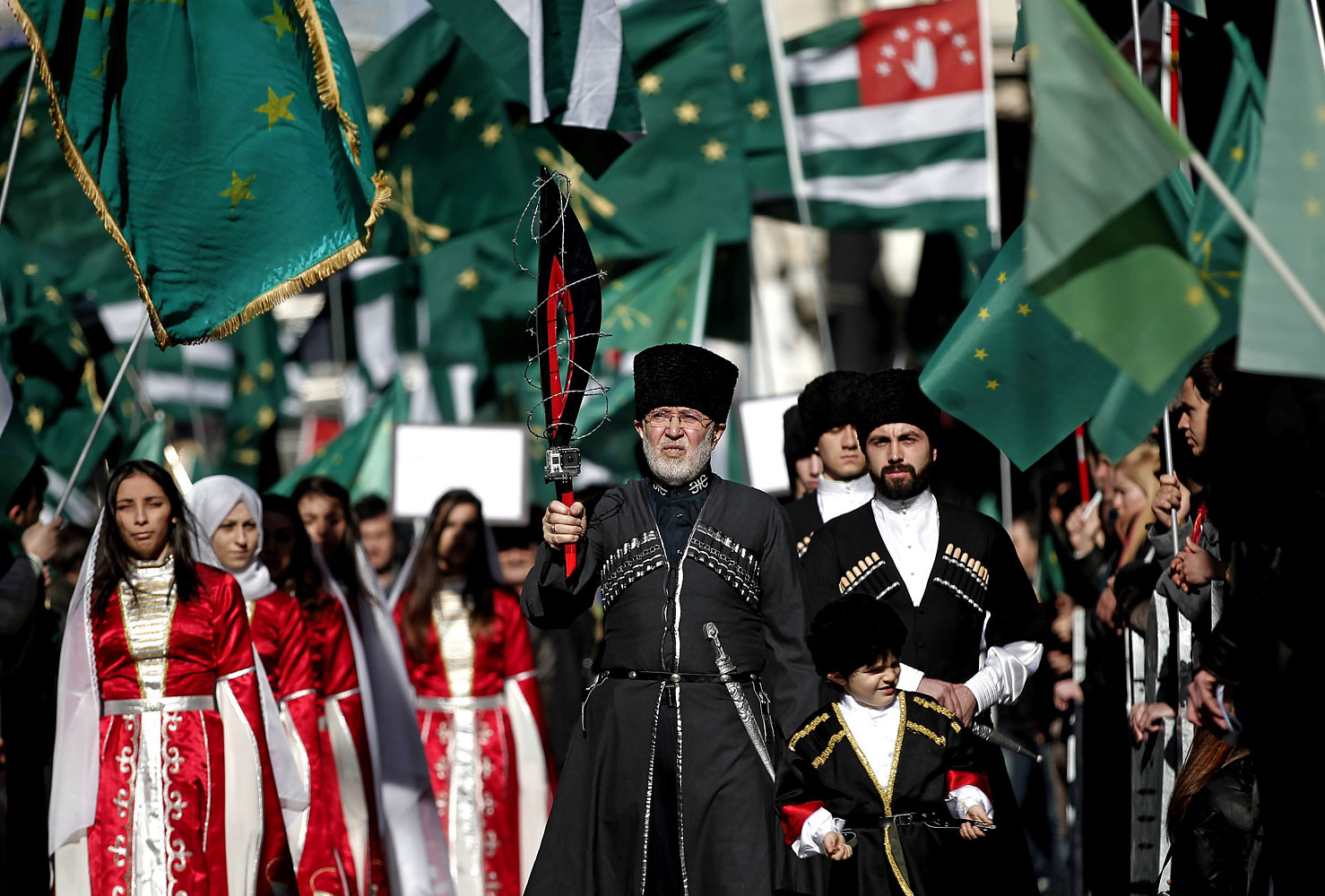
Last July, Doku Umarov, a shadowy militant leader operating in Russia’s North Caucasus, urged Muslims through a video message to launch attacks on the Winter Olympics, which begin this week in the Black Sea resort of Sochi. The events to be held there, Umarov claimed, constitute “Satanic dancing on the bones of our ancestors.” His dark pronouncements, as well as terror strikes that recently hit a southern Russian city, set the tone: Sochi’s Games have become the most anxiety-ridden and militarized Olympiad in recent memory. If there is any sort of dancing to be done, it will involve quite a few heavy army boots. But what of those ancestors’ bones?
Long before the punk rock group Pussy Riot or global gay rights activists sought a boycott of the Olympics, a forgotten community clamored loudly against the events in Sochi. The Circassians, whose history of dispossession and exile Umarov opportunistically invoked, are a scattered, largely Muslim people native to the Caucasus, now found mostly outside of Russia in Turkey and parts of the Middle East. Their original homeland stretches from the eastern rim of the Black Sea – where Sochi sits – to the rugged western highlands of the Caucasus, but few of its indigenous inhabitants remain there.
By the mid-19th century, Tsarist Russia sought to expand its dominion to the south, eyeing the ancestral lands of the Circassians and other realms of the Caucasus, which were earlier under the loose control of a declining Ottoman Empire. In 1864, Russian forces defeated the last resisting armies of the Circassians and carried out “the first modern genocide on European soil,” writes Oliver Bullough, author of Let Our Fame Be Great: Journeys Among the Defiant People of the Caucasus, a critically-acclaimed book on the region.
The conquest, by some accounts, led to an ethnic cleansing: during the great expulsion of the Circassians, violent deportations, slaughters of civilians and the onset of famine and disease decimated half of their then 2 million strong population. Russian colonization followed. According to the Financial Times, Sochi’s lavish ski complex at Krasnaya Polyana is “built on the site where most of the Circassians ‘cleansed’ from the surrounding region froze and starved to death—almost exactly 150 years ago—as they awaited deportation.” Those who survived mostly fled to the Ottoman Empire, which itself was soon to collapse. Currently, some two to five million people in Turkey claim Circassian or other Caucasian heritage. Circassian diasporas exist in Jordan, Syria, Israel and even as far afield as New Jersey.
But after more than a century in exile, their hold on the global imagination is thin. That wasn’t always the case: Circassian women, renowned for their beauty, were lusted after by generations of monarchs across the Mediterranean world, while early European Orientalists obsessed over the Circassians’ elegant coats and robes. Still, the exoticism of the past has yielded no clout in the present and some liken the Circassians’ plight to the much-diminished Native Americans of North America.
A Circassian lobby group in Israel wrote a letter to the International Olympic Committee after it awarded the Winter Olympics to Sochi, insisting that “we regard the holding of the Olympic Games on our homeland in the places of mass graves and genocide as an act of vandalism.” The IOC did not even respond to the message. Months of protests by Turkish Circassians outside Russian institutions in Istanbul and elsewhere raised awareness, but achieved little else. Turkish Prime Minister Recep Tayyip Erdogan heads to Sochi on Friday; Russia is a key source of oil and natural gas for Turkey.
In Russia, where some 700,000 Circassians — known as Adyghe — live, their objections have been met by silence and intimidation. Decades of Tsarist and Soviet population policies have seen myriad communities dispersed and relocated, borders redrawn and ethnic homelands erased from the map. The Circassians’ experience is a particularly brutal one, but they are hardly alone. And Russia’s rulers are in no mood to pander. Bullough cites Russian President Vladimir Putin taking a stand on Russian history during a speech in 2007: “It must not be allowed that we are forced to feel a sense of guilt,” he said.
When Putin made his pitch for Sochi, reports the FT, he hailed its rich cultural past, citing the coastal colonies of the ancient Greeks. But, to the ire of Circassians around the world, he made no mention of the people Russia removed from its soil. In recent weeks, Circassian activists and members of civil society who may have voiced their disquiet over Sochi have been detained or called in for questioning in neighboring Russian republics. The contrast between this and the previous Winter Olympics in Vancouver, where Canadian organizers made special effort to spotlight their native inheritance, could not be more stark.
“The Russians have not preserved the memory of their wars for the Caucasus,” writes Bullough, “and the ghosts of their victims will haunt them till they do.” The terror fears surrounding Sochi are in part a consequence of this. But that’s hardly a consolation for the millions of Circassians whose own history has been scribbled away in the footnotes of others and who may look at the celebrations taking place in their homeland only with a sense of loss.
More Must-Reads from TIME
- Donald Trump Is TIME's 2024 Person of the Year
- Why We Chose Trump as Person of the Year
- Is Intermittent Fasting Good or Bad for You?
- The 100 Must-Read Books of 2024
- The 20 Best Christmas TV Episodes
- Column: If Optimism Feels Ridiculous Now, Try Hope
- The Future of Climate Action Is Trade Policy
- Merle Bombardieri Is Helping People Make the Baby Decision
Contact us at letters@time.com